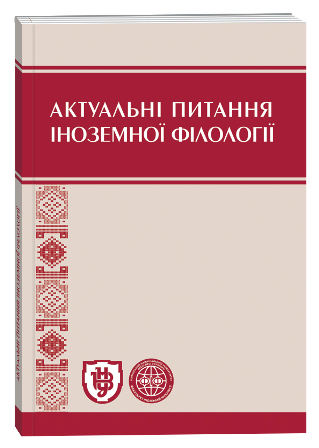TRANSLATING THE CONCEPTS EXPRESSED IN SECULAR LYRICS BY SELECTED FEMALE EUROPEAN GOVERNMENT LEADERS OF THE TENTH TO SIXTEENTH CENTURIES (USING ENGLISH AND GAELIC POETRY AS SOURCE MATERIAL)
Keywords:
translation, poet, female leader, Elizabeth I of England, Mary Stuart, GormlaithAbstract
From a contextual standpoint, an overview is given of the motifs and symbols which form the base of secular lyrics written by tenth- to sixteenth-century government leaders, especially of Britain and Ireland. The poetological, microcontextual, Translation Studies, cultural analysis is made. First of all, selected poems by Elizabeth I Tudor and medieval Irish female poets have been translated into Ukrainian, and anonymous female folk of Scotland is analyzed. The principles of lyrics by Elizabeth I of England and Mary Stuart are compared. Because of the isolation of cultural continuity the lyrics of the latter poet is compared with the work of Scottish female authors in female songs (“waulking songs”). By means of of comparative analysis the problems of gender and the marriage relationship are illustrated by the person of The Wife of Bath (in the Middle English original – “A good wif was ther of biside bathe”) (“The Canterbury Tales” by Geoffrey Chaucer) as a typical heroine of her time, a leader and a talented narrator. Her view is compared to the lyrics of queens – those of Ireland (Gormlaith) and Scotland (Mary Stuart). The context of Irish scels is given. The heroines of these scels have poetic talent and a right of self-expression. Some examples are: Deirdre, Sin, Scáthach, Fe(i)delm, and real fili Liadaine. The character of Mary Stuart's poetry is analysed, as well as her pattern of governing. Her connection with the Celts is given; however, historical fact shows that the queen had Romance origins, rather than Scottish ones. One of the arguments for this thesis is the first Ukrainian translation of her sonnet (by Lesya Ukrainka, who, like others, knew about Mary of Scotland only through French sources). The article has theoretical and practical value.
References
Блум Г. Західний канон: книги на тлі епох / Гарольд Блум ; [пер. з англ., під заг. ред. Р. Семківа]. – К. : Факт, 2007. – 720 с. – (Сер. «Висока полиця»).
Вибрані вірші ірландської королеви Ґормлайт (Х століття) / із середньоірландської формою оригіналу переклала О. Смольницька ; [автор. комп. набір]. – К., 2012–2013. – 16 с. – (З особистого архіву Ольги Смольницької).
Графиня Ізабель ні Мік Кайлін (Isibeul ní Mhic Cailín). Кохання – прикра хвороба – Mairg darab galar an grádh / [з ранньоновоірландської формою оригіналу переклала О. Смольницька] // Середньовічна ірландська поезія (ХV ст.) ; [автор. комп. набір]. – К., 2013. – 1 с. – (З особистого архіву Ольги Смольницької).
Грэм Р. Мария Стюарт / Родерик Грэм ; [пер. с англ. и вступ. ст. А. Ю. Серёгиной]. – М. : Молодая гвардия, 2010. – 396 с. – (Сер. «Жизнь замечательных людей»).
Єлизавета І Англійська Тюдор (1533–1603) / [передм., приміт. і пер. зі староангл. О. Смольницької] ; [aвтор. комп. набір]. – К., 2013. – 5 с. – (З особистого архіву Ольги Смольницької).
Кашникова И. В. Мария I Шотландская: биография и лирика (религиозный и гендерный аспекты) / И. В. Кашникова, М. А. Новикова, М. О. Стогний, С. Э. Трош // Культура народов Причерноморья : науч. журн. – 2013. – № 263, т. 1. – С. 155–161.
Стріха М. Улюблені переклади : поезії / М. В. Стріха. – К. : Укр. письм., 2015. – 724 с. – (Сер. “In corpora”).
Українка Леся. Камінний господар / Леся Українка // Українка Леся. Зібрання творів : у 12 т. Т. 6 : Драматичні твори (1911–1913). Переклади драматичних творів. – К. : Наук. думка, 1977. – С. 161.
Українка Леся. Остання пісня Марії Стюарт / Леся Українка // Українка Леся. Зібрання творів : у 12 т. Т. 1 : Поезії. – К. : Наук. думка, 1975. – С. 91, 401.
Alasdair Mhic Cholla Ghasda – Александер, син шляхетного Голли / із шотландсько-ґельської формою оригіналу переклала О. Смольницька] ; [автор. комп. набір]. – К., 2016. – 3 с. – (З особистого архіву Ольги Смольницької).
Hudson J. Amelia Bassano Lanier: A New Paradigm / John Hudson // Oxfordian. – 2009. – Vol. XI. – P. 65–77.
Parr K. To Be Useful in All That I Do [Electronic resource] / Katherine Parr. – Access mode : http://tudorhistory.org/parr/.








